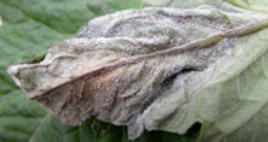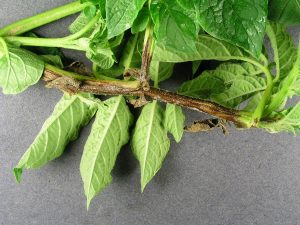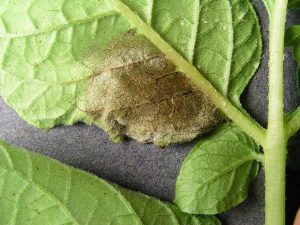Late Blight Gardener Alert
Late Blight Information for Every Gardener in Maine
An effort of the Maine Late Blight Task Force, a cooperative effort of the University of Maine, the Maine Department of Agriculture, Food and Rural resources, and the Maine Potato Board.
- Late blight on tomato leaves. – Photo, Jim Dill
- Late blight on a potato stem. – Photo, Bruce Watt
- Late blight on a potato leaf. – Photo, Bruce Watt
Potato and Tomato Late Blight:
- Is a community disease, as an infected garden can spread spores and affect commercial potato fields miles away.
- Can cause severe losses in commercial potato production.
- Has forced commercial potato growers out of farming. This closes a business and stresses rural families and the local economy.
Before planting, home gardeners can:
- Use healthy tomato transplants and certified seed potatoes, NOT potatoes from a grocery store.
- Discard potato seed that has sunken blemishes on the surface with rusty, granular discoloration in the flesh underneath.
After planting, home gardeners can:
- Allow sufficient space between plants to allow the tops of the plants to remain dry.
- Protect the growing potato and tomato plants with products containing mancozeb, maneb, or chlorothalonil. These are available at garden centers and should be applied at seven-day intervals or as directed on the label. Local potato growers can also provide advice on spray timing.
- Check the plants regularly for the disease. If symptoms appear, pull the diseased plant and place it in a plastic bag. Discard the bag without opening it. DO NOT place the diseased plant into a compost pile or leave it in the garden. Both tomato fruit and potato tubers are quickly broken down when late blight attacks them. Non-infected potato tubers or tomato fruits, even if the plant is diseased, are usable.
- Check the harvested tomato fruit and potato tubers regularly as the disease can progress quickly. Discard infected fruit, plants or tubers in a sealed plastic bag.
Videos:
Identifying Late Blight, University of Maine (YouTube)
Managing Late Blight: Second in the Series, University of Maine (YouTube)
For further information, contact:
- University of Maine Cooperative Extension: 1.800.287.1462
- Maine Potato Board: 1.800.553.5516
- To Download and Print: Late Blight Gardener Alert (PDF)



